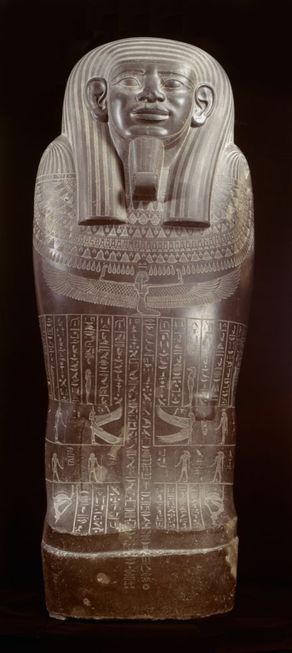
Sarcophagus of Wahibreemakhet, Egyptian, Dynasty 26, about 600 BC, basalt
Rijksmuseum van Oudheden, Leiden, AM 4-a. Image: National Museum of Antiquities, Leiden
Transcript
[Militaristic drum with strumming lyre]
Sara Cole: What we're looking at here is a stone anthropoid sarcophagus that takes the shape of the human being and represents the individual who would have been buried inside of it.
Female Narrator: Sara Cole.
Sara Cole: The deceased individual, who was a man named Wahibremakhet, is shown wearing a false beard on his chin, which is attached to his ears by straps, and on his chest he's wearing a large necklace made up of multiple rows of beads. And those strings of beads are connected at each shoulder to falcon-head finials. And beneath that we see a goddess kneeling and spreading her wings in a protective gesture. Wahibremakhet had an official title as Royal seal Bearer so he would have been a high-ranking individual who could afford luxurious burial goods.
Female Narrator: The style of this sarcophagus, as well as the language and iconography on it, are entirely in the Egyptian tradition. So does that mean Wahibremakhet was Egyptian? Not according to Sara Cole.
Sara Cole: What we also learn from the inscription is the names of Wahibremakhet's parents. His parents have Greek names, so he was born to Greek parents living in Egypt, but Wahibremakhet is an Egyptian name. So that raises all sorts of interesting questions about how he identified culturally and religiously during this period, around 600 BC.
Female Narrator: At that time a lot of Greeks served in the Egyptian Army as mercenaries.
Sara Cole: Perhaps his father was a mercenary who settled in Egypt and brought his wife with him, and then Wahibremakhet grew up in an Egyptian context. It's possible that he was born with a Greek name, and then given the name Wahibremakhet as an honorific. It's possible that he went by both the Greek and an Egyptian name in life. We know from later periods that people sometimes went by these double names.
Female Narrator: Even though Wahibremakhet had Greek parents, he chose to be buried like an Egyptian.
Sara Cole: That signals to us that we need to be very careful about assuming anything about one's cultural origins or identity based solely on the style of their art.
[Music ends]